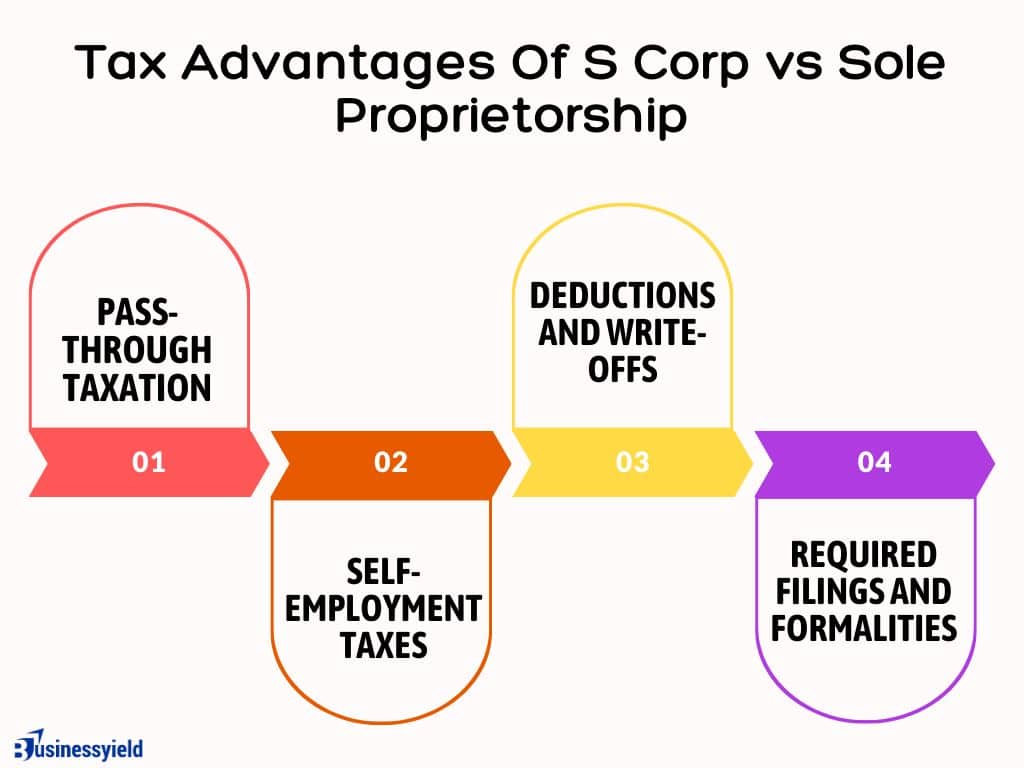When I started my business, I remember the excitement and uncertainty that came with starting my own business. One of the most crucial decisions I faced was choosing the right business structure. While there are several options available, the decision often boiled down to two popular choices: S corporation (S Corp) vs sole proprietorship. Both structures have their own advantages and challenges, and understanding the differences between them is essential for making an informed decision that aligns with your business goals and aspirations. Here, I will share S corp vs sole proprietorship comparison, including LLC and their tax advantages to help you choose the best that aligns with your entrepreneurial goals. So, let’s dive into the world of business structures and explore the differences between these two popular options.
Key Points:
- S corp vs sole proprietorship are two common business structures, each with its own advantages and disadvantages.
- S corps offer limited liability protection to owners, while sole proprietorships do not provide any legal separation between the business and the owner.
- More formalities and paperwork are required of S corps compared to sole proprietorships, which are simpler to set up and operate.
- Taxation is another factor that differs between the two structures, as S corps are taxed separately from their owners, while sole proprietors report business income on their personal tax returns.
S Corp vs Sole Proprietorship
When it comes to choosing between an S corp vs a sole proprietorship for your business, the decision can have a significant impact on your operations and financials. Having had firsthand experience with both structures, I can provide insights into their differences and how they can shape your entrepreneurial journey.
Let me start with a sole proprietorship, which is a popular choice for many small businesses due to its simplicity and ease of setup. As a sole proprietor, you have complete control over your business decisions, and all profits belong to you. For instance, when I first started my freelance writing business as a sole proprietor, I appreciated the flexibility and autonomy it offered. However, one downside I encountered was the unlimited personal liability for business debts and obligations. In one instance, a client failed to pay for a project, and I was personally liable for the losses incurred.
On the other hand, an S corporation is a tax designation rather than a business structure itself. Forming an S corporation can provide certain advantages, especially as your business grows. By electing S corp status, you can separate your assets from those of the business, reducing your liability. When my writing business expanded, I transitioned to an S corp structure to protect my assets. Additionally, S corporations offer tax advantages, allowing business profits to “pass through” to your tax return. This setup can result in potential tax savings compared to a sole proprietorship.
While the administrative requirements and costs of maintaining an S corporation are higher than those of a sole proprietorship, the added liability protection and tax benefits can outweigh the initial complexities. Therefore, I advise you to weigh these factors against your business goals and risk tolerance.
Sole Proprietorship vs LLC vs S Corp
When comparing sole proprietorship vs LLC (Limited Liability Company) vs S corp as business structures, first consider various factors that can impact the decision-making process. Each structure has its advantages and disadvantages, and the choice depends on your needs and goals.
#1. The simplicity and ease of setup for each structure
As a business owner considering these options, first evaluate the simplicity and ease of setup for each structure. A sole proprietorship is the simplest form of business entity to establish since it does not require any formal paperwork or filings. This structure is easy to set up and has minimal regulatory requirements. For instance, if you’re a freelance writer wanting to start your own business, operating as a sole proprietorship will be the most straightforward option. However, the downside is that you’ll have unlimited personal liability for the business’s debts and obligations.
On the other hand, an LLC, or Limited Liability Company, combines the simplicity of a sole proprietorship with the limited liability protection of a corporation. If you’re a consultant looking to expand your business and take on partners or investors, forming an LLC would be beneficial. This structure would shield your assets from business liabilities and provide flexibility in terms of management structure and tax treatment. Additionally, an LLC offers pass-through taxation, meaning the business’s profits and losses are reported on my tax return. To know more about LLC, read this LLC ADVANTAGES AND DISADVANTAGES: What you Need!!!
Conversely, an S corporation also offers limited liability protection to shareholders, similar to an LLC. However, it requires stricter formalities such as holding regular board meetings, keeping detailed corporate records, and following specific operational protocols. By electing S corp status with the IRS, you can avoid double taxation by passing profits and losses through to the shareholders’ tax returns. Assuming you want to save on self-employment taxes as a consultant earning a substantial income, choosing S corp status can be advantageous. However, S corporations have stricter eligibility requirements. This includes having a limited number of shareholders and only one class of stock.
#2. Taxation
Furthermore, when considering taxation, sole proprietorships and LLCs are taxed as pass-through entities, where business profits are taxed at the individual tax rates of the owner. On the other hand, S corporations have the added benefit of the potential for tax savings through the distribution of dividends instead of paying a self-employment tax on all income.
#3. Scalability and raising capital
In terms of scalability and raising capital, an S corporation may be a more attractive option. This is due to the ability to issue multiple classes of stock and have an unlimited number of shareholders. Additionally, this can make it easier to attract investors and expand the business in the future.
To sum up, the decision between a sole proprietorship vs LLC vs S corp depends on various factors. This includes liability protection, taxation, management structure, and long-term business goals. So, I recommend considering these factors carefully and consulting with a legal or financial advisor. He/she will help you determine the most suitable structure for your specific business needs.
Tax Advantages Of S Corp vs Sole Proprietorship

I often get asked about the tax advantages of S corp vs sole proprietorship. Both business structures have their benefits, but when it comes to taxes, there are some key differences to consider. Hence, here are some of the key tax advantages of S corp vs sole proprietorship:
#1. Pass-through taxation
One of the main advantages of an S corp is that it is a pass-through entity. This means that the profits and losses are passed through to the shareholders and reported on their tax returns. So, this can result in potential tax savings compared to a sole proprietorship.
#2. Self-employment taxes
If you’re a sole proprietorship, all profits are subject to self-employment taxes, which include both Social Security and Medicare taxes. In contrast, S corp owners can potentially reduce their self-employment tax liability by paying themselves a reasonable salary and taking the remainder of their income as a distribution.
#3. Deductions and write-offs
S corporations may offer more opportunities for deductions and write-offs compared to sole proprietorships. Business expenses such as health insurance premiums, retirement plan contributions, and certain fringe benefits may be deductible for S corp owners.
#4. Required filings and formalities
While both S corp vs sole proprietorship require annual tax filings, S corps are to file a separate tax return Form 1120S, in addition to the shareholders’ tax returns. Sole proprietorships, on the other hand, report business income and expenses on Schedule C of their tax return.
Having understood the tax advantages of S corp vs sole proprietorship, there are also disadvantages. So, I have compiled the disadvantages of S corp vs sole proprietorship in the document below!
Disadvantages Of S Corp vs Sole Proprietorship
What Is The Biggest Difference Between A Sole Proprietorship And A Corporation?
With my experiences, I can confidently say that the biggest difference between a sole proprietorship and a corporation lies in their legal status and structure. In a sole proprietorship, the business is owned and operated by one individual. This makes them personally liable for all aspects of the business, including debts and legal actions.
On the other hand, a corporation is a separate legal entity from its owners, providing limited liability protection to shareholders. This means that in a corporation, the owner’s assets are typically shielded from business liabilities. Additionally, corporations have a more complex structure with shareholders, a board of directors, and officers, whereas sole proprietorships are simpler in terms of management and decision-making processes.
Can You Have A Partner In A Sole Proprietorship?
Basically, sole proprietorship is owned and operated by a single individual. This means that technically, you cannot have a “partner” in a sole proprietorship in the traditional sense of the word. However, you can still involve others in your business operations by hiring employees or working with contractors.
When I started my sole proprietorship, I realized that while I was the sole owner, I could collaborate with individuals on specific projects or tasks. For example, I hired a freelance graphic designer to create my business logo and a virtual assistant to help with administrative tasks. These individuals were not my partners in the business but rather independent contractors who provided services to support my business.
Therefore, remember that in a sole proprietorship, you have full control and responsibility for the business. While you can seek help from others to grow your business, they do not have ownership rights or decision-making authority. This setup allows you to maintain autonomy and flexibility in running your business while still leveraging external skills and expertise when needed.
What Is An Example Of An S Corporation?
One example of an S corporation is a small family-owned business, such as a local bakery or a consulting firm. Let’s take the example of a family-owned bakery called “Sweet Delights.” This bakery decided to operate as an S corporation to take advantage of the tax benefits and limited liability protection that this business structure offers.
As an S corporation, Sweet Delights can have up to 100 shareholders, who are typically family members in this case. The bakery’s profits and losses are passed through to the shareholders in proportion to their ownership stake. Hence, this means that the shareholders report their share of the bakery’s income on their tax returns.
So, operating as an S corporation allows Sweet Delights to avoid the double taxation that traditional C corporations face. Additionally, the limited liability protection ensures that the personal assets of the shareholders are protected. That’s in case the bakery faces any financial liabilities or legal issues.
Why Is It Called An S Corporation?
I am not surprised that most people have been asking why it’s called an S corporation. Well, I am going to explain. The “S” in S corporation refers to Subchapter S of the Internal Revenue Code. This special tax status allows small businesses to avoid double taxation. This means by passing corporate income, losses, deductions, and credits through to their shareholders. By electing to become an S corporation, you ( as a business owner) can enjoy the benefits of limited liability while also taking advantage of tax savings.
So, the next time you come across the term S corporation, remember that it’s not just a random letter – it holds the key to tax advantages and opportunities for small business owners. Overall, I urge you to embrace the spirit of entrepreneurship and let the “S” in S corporation inspire you to reach new heights in your business journey.
Why Sole Proprietorship Is Better Than Partnership Or Corporation?
When choosing the right business structure, I have always believed that a sole proprietorship offers distinct advantages over a partnership or corporation. Firstly, operating as a sole proprietor gives you flexibility and control in running your business. Personally, I appreciate being able to make decisions quickly and independently without having to consult with partners or shareholders. This autonomy will allow you to steer the business in the direction that I believe is best. I mean without the need for lengthy discussions or debates that can sometimes slow down progress in partnerships or corporations.
Additionally, the simplicity and ease of setup and management of a sole proprietorship have always appealed to me. Establishing a sole proprietorship typically involves fewer legal and regulatory requirements compared to forming a partnership or corporation. This makes the startup process smoother and less time-consuming.
Moreover, as a sole proprietor, you have the freedom to keep all profits generated by the business, without having to share them with partners or stockholders. This financial benefit, along with the minimal paperwork and lower administrative costs associated with sole proprietorships. All these make them an attractive option for individuals looking to start and operate a business independently. Ultimately, for me, the autonomy, simplicity, and financial advantages of a sole proprietorship outweigh the benefits partnerships or corporations offer.
Why Do Sole Proprietorship Fail?
I have always been passionate about entrepreneurship, and I have seen firsthand the challenges that sole proprietorships face. One scenario that comes to mind is a friend of mine who started a small bakery as a sole proprietor. At first, business was booming as she attracted a loyal customer base with her delicious treats. However, over time, she began to struggle to keep up with the demand and maintain the quality of her products while also handling all the administrative and financial aspects of the business alone.
From my experience and observing others, I believe that sole proprietorships fail for several reasons. Firstly, the lack of resources and capital can be a significant hindrance. As a sole proprietor, you are solely responsible for funding the business and may struggle to secure enough finances to invest in growth and withstand unexpected expenses.
Secondly, the limited expertise and skills of a sole proprietor can also lead to failure. Running a business requires a diverse set of skills, from marketing and sales to finance and operations. Without a team to rely on, the burden of managing all aspects of the business can become overwhelming.
Additionally, the lack of scalability is a common issue for sole proprietorships. As the business grows, the owner may find it challenging to expand operations or reach new markets without the support and resources of a team. Hence, this can result in missed opportunities for growth and innovation.
Lastly, the personal liability of a sole proprietorship can be a significant risk factor. For instance, in case of financial difficulties or legal issues, the owner’s assets are at stake, putting their financial security at risk.
Wrapping Up
When comparing S corp vs sole proprietorship, first consider factors such as liability protection, tax implications, and operational flexibility. While a sole proprietorship is simpler to set up and operate, an S corp provides limited liability protection to its owners and may offer certain tax advantages. Ultimately, the decision between the two business structures should be based on your specific business goals, financial situation, and long-term plans. Lastly, I urge you to seek professional advice from a legal or financial expert before selecting a business structure. Besides, this ensures that your choice aligns with your objectives and provides the necessary legal and financial protections.
Stakeholders vs Shareholders: Understanding the Difference in Corporate Governance
WHAT IS AN S CORP: Requirements, Difference & Disadvantages
LLC vs CORPORATION: The Pros and Cons






